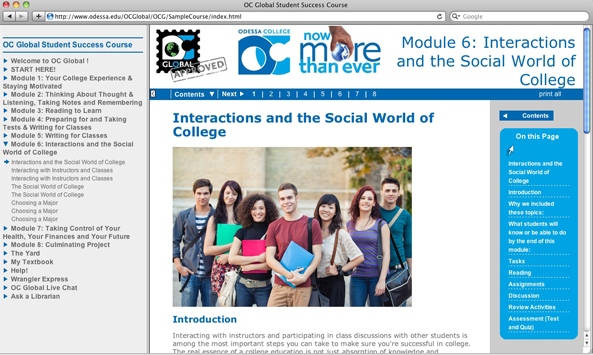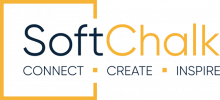 Odessa College students are now able to take academic courses anywhere, anytime through a new online program called OC Global.
Odessa College students are now able to take academic courses anywhere, anytime through a new online program called OC Global.
This month’s innovators webinar will feature the OC Global program and how SoftChalk is used to re-create the course textbook, making it more accessible for diverse learners, including English-language learners, low-performing students, students with learning disabilities, and students with psychological problems.
As a preface to the webinar we’re sharing a brief interview with Corey Davis, the Executive Director of OC Global today. Read on to find out some of the exciting details about OC Global, the program that gives students the flexibility to complete courses in a shorter time frame outside the constraints of the conventional academic calendar!
What is OC Global?
OC Global is a unique online offering of accelerated and self-paced core transfer courses and completely online Associate Degree programs that allow students to complete a degree on their own schedule. The core courses offered through OC Global can be transferred to any Texas institution.
OC Global offers completely online degree programs for an Associate in Arts – English, Psychology, Sociology and Speech.
What made Odessa College decide to create the program and how long did it take to develop?
Odessa College has been offering courses online since the days of the dial up modem. However, the concept of OC Global began four years ago with an idea about creating a different way for students to go to school. After three years of talking and one year of testing we have come up with what we think is an effective approach to educational environment with asynchronous learning opportunities that support a completely online community with parallel academic rigor and resources for students.
Of all the things that OC Global represents, the most important of these comes back to one thing – Odessa College’s commitment to student access and student success for ALL of its students.
How many classes/courses do you offer and how many students are currently enrolled?
We currently offer 109 Texas Core Curriculum Transfer courses including Humanities, Natural Sciences with labs, Visual and Performing Arts and the Social and Behavioral Sciences. One of our goals to offer courses that people say can’t be done online. We currently offer four completely online degrees: English, Psychology, Sociology, and Speech.
What are the advantages of taking OC Global courses?
There are several advantages:
- Flexible Enrollment: OC Global courses start every four weeks, so you do not have to wait for the beginning of the next semester to start classes.
- Courses available “on demand.” If there is a core course that a student needs, but it is not listed in the schedule, a student can request and OC Global can provide it for you, in some cases in less than a week.
- Free textbooks. One of our missions is to make college more accessible by making it more affordable and one of the ways we do that is by utilizing high quality open source content. An electronic textbook (e-book) is provided free in most (but not all) of the OC Global courses.
- Flexible due dates. All of our courses have flexible assignment due dates, allowing students to work and complete the course at their own pace.
- The “OC Global Guarantee.” This policy allows a student who fails an OC Global course to repeat that course tuition free providing they made a good faith effort to complete the course.
- The “OC Global Student Success Scholarship” This scholarship provides financial assistance to students enrolled in core courses or degree programs offered by OC Global.
Who develops the course content for the OC Global courses?
I layout the “landscape” of every course utilizing a design aesthetic and instructional approach that is based on several frameworks: Donald A. Dorman’s The Design of Everyday Things, one of the most important books you can read in designing a good online courses, and heavily rooted in brain theory; Steve Krug’s Don’t Make Me Think: A Common Sense Approach to Web Usability, another important read; Madeline Hunter’s ITIP model for direct instruction, an “old-school” teacher decision-making model for planning and delivering instruction; Specially Designed Academic Instruction in English or SDAIE strategies, an instructional approach that was originally developed to support English Language Learners at the elementary level, but which we’ve adapted to support academic language and subject matter knowledge acquisition; and AVID (Advancement Via Individual Determination) instructional strategies. You will find all of these frameworks at work in our online courses.
Bottom line, I design these courses for me. Even though I graduated valedictorian of my high school and attended one of the top universities, Stanford University, I struggled a great deal in school because I’m dyslexic and suffer from extreme Attention Deficit Hyperactivity Disorder. To get help in school (which I was deeply ashamed to ask for), I had to apply for accommodations and that was a painful, embarrassing, and long process. So when I began designing courses I made sure to build-in accommodations up-front. No child, no student should have to ask for the help – the instructional scaffolds – that should already be there in the first place.

I know you are using SoftChalk to development the textbooks for the OC Global program, what features have the course developers found most valuable?
We made SoftChalk our primary course-authoring tool because it is customizable beyond what any LMS allows for out of the box. To get the kind of customization that we were after with traditional LMS’s, even open source ones, you have to pay big bucks! By manipulating SoftChalk’s features we can present – very cost effectively, mind you – content the way in which it is presented in a book and on a webpage, which I see as the most intuitive and natural and certainly most common ways in which people access information, NOT the folder structure that dominates the layout of traditional LMS. Clicking on folders disrupts the flow of reading and comprehension because there is nothing to hang the next page’s content with the previous’ ones. SoftChalk “pages” structure allows for a steady stream of “comprehensible input.”
Central to our design is the idea of “one canvas,” meaning we want all of the content to be presented on one page and in one place, NOT through a series of disconnected pop-up windows. Talk about distraction! With SoftChalk’s iframe function we can limit distraction and focus attention to the content at hand, pulling other websites and document-based content directly onto one page.
Another one of our main goals is to deliver courses that can be taken on mobile devices. Using SoftChalk’s mobile friendly activities we’ve created courses in which 75% of it can be accessed on a smartphone, and about 50% on it on regular cell phone. The goal is a 100% on both.
And we wanted classes that were fun and engaging. SoftChalk’s interactive activities help make that possible.
What feedback have you gotten about the OC Global program from students thus far?
To make use (and sense) of student feedback, you have to be able to interpret “student-speak.” Our students are not going to tell us, “The instructional design and layout of your course facilitates greater content acquisition and mastery which in turn leads increased student achievement.” They’re going to say, “This is easy.” They are not going to tell us “This course fosters a high level of engagement and student-to-student and instructor-to-student interaction.” They’re going to say, “It’s fun!” Those are the two most common feedbacks we get from students. Oh, there’s a third one: “This is different”!
Thank you so much for your time Corey, in closing are there any additional facts about OC Global that you would like to share?
A huge part of our goal here is to not only engaging our students, but to engage AND EXCITE the entire distance education community and to encourage the exchange of open course content. Toward this end, we will be sharing our ideas and innovations including access to some of our courses through our website, www.myocglobal.com.
Finally, I want to extend my gratitude to SoftChalk, a big company who took the time to support a small community college and helped us do something great. For that, I can’t thank you enough.
Learn more about Odessa College and OC Global by watching the archived Innovators Session featuring Corey Davis.

2 Comments
DR. LOU THARP
I think we have very similar interests and worldviews. I was a scholarship student at Yale – but I have retained my childhood identity as a kid from a poor family. I absolutely believe in making education available to ALL people – as inexpensively as possible. I earned a Ph.D. in California and taught for 33 years at Long Beach City College. I designed a course myself – called Issues in Philosophy, Psychology, and Religion – that became the most popular course on campus. When I retired, I joined an Internet startup and went to Malaysia for 2 years to create a complete online education system for their education department. I am retired, but I have a LOT of energy and am constantly working on new projects.
I would love to talk and brainstorm ideas with you when you have some spare time. Send me an email address and I will send you some ideas that I think will be very useful to your Global program.
Lou Tharp
727-642-8201 – cell
January 2012 eNews – SoftChalk Celebrates 10 Years In 2012 « Virtual School Meanderings
[…] Don’t forget – the 2012 Innovator series starts this month with a new session that features OC Global, an online program at Odessa College, and how they are using SoftChalk to create textbooks. Sign up for the session below! To learn more about the innovative program at Odessa before the webinar, be sure to check out our interview with Corey Davis, the Executive Director of OC Global. […]